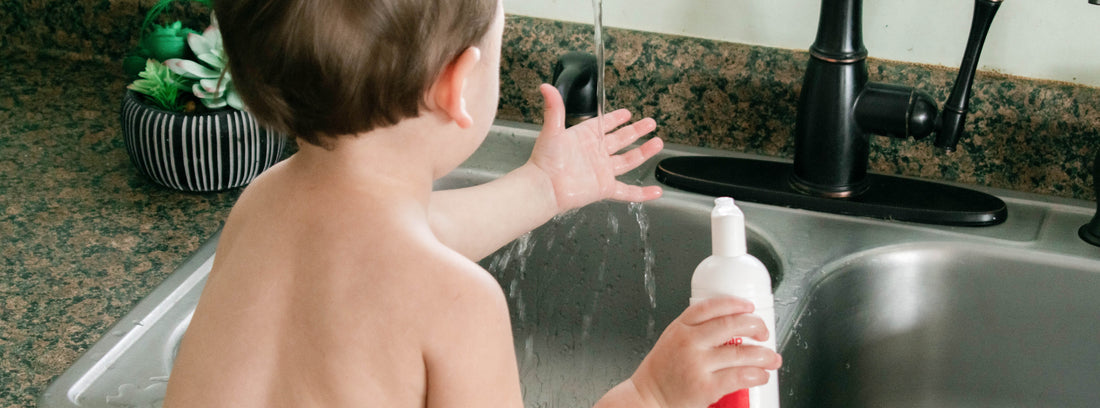We put great care into making the best goat milk soap possible. We designed a bar of soap that moisturizes your skin, lasts a long time, and lathers well. Why? To create a bar of soap you can consistently love.
Every once in awhile I will hear from somebody asking if we changed our soap (we didn't and won't) because a new bar doesn't lather as well as they're used to. The first question I ask them is if there has been any change in their water supply. This is a big issue because the quality of your water affects many aspects of your soap.
What is hard water?
The mineral content of your water determines how hard or soft your water is. Hard water has a higher mineral content and soft water has a low mineral content. Rainwater is naturally soft. When the rainwater hits the ground, sometimes it trickles through rocks on the ground or in the soil, as well as porous rock layers underground.
If the water trickles through material with a high mineral content (such as limestone or gypsum which both have high magnesium and calcium deposits), the exposure and contact give the water a high mineral content. This turns the once soft rainwater into hard water.
How goat milk soap works with water to clean
On its own, water is not very effective at removing dirt from clothes or skin. Water alone is even less effective at cleaning stains that contain oil since water and oil don't mix. Water requires soap to be effective at cleaning.
Likewise, soap alone is not a very good cleaner. It requires water to work properly based on its molecular structure and how it actually cleans.
Soap molecules have two ends, one is hydrophilic (attracts water) and the other is hydrophobic (repels water). When you use soap to clean, you want to rub it on whatever surface (skin, clothes, counters) thoroughly because you want the hydrophobic end of each soap molecule to attach to a molecule of dirt or oil.
When you've soaped up enough and feel you've gotten all the dirt molecules, you then use water (which then attaches to the hydrophilic end of each soap molecule) to flush it all down the drain. So the dirt/oil sticks to the soap, the soap sticks to the water, and it all gets rinsed down the drain.
Hard water negatively impacts the ability of soap to clean
Soft and hard water are at opposite ends of a continuum, so there are different degrees of water hardness or water softness. The harder the water, the more negative impacts it will have on your goat milk soap.
1. The use of hard water produces soap scum. The high mineral content of hard water includes many calcium and magnesium ions. These ions in hard water react with the sodium ions in soap and cause the creation of calcium and magnesium salts. These calcium and magnesium salts are what we call soap scum. They are created in the presence of hard water.
2. Soap scum blocks soap from reaching what it needs to clean. When these soap scum (magnesium and calcium salts) are created, they initially stick to your skin, laundry, or whatever you are trying to clean. Their physical presence can cover or block the dirt molecules that the soap is trying to reach, reducing the effectiveness of soap.
3. Hard water requires you to use more soap. Because hard water produces soap scum which decreases the effectiveness of soap, to get the same level of clean, more soap is needed when using hard water. If you don't feel like your soap is lasting as long as it should, it may be due to the use of hard water.
4. Hard water also interferes with the soap's ability to lather. As mentioned, in hard water the formation of soap scum uses sodium salts in the soap. These are the same compounds that help create soap bubbles. So the depletion of sodium salts hinders the formation of soap lather. The same bar of soap will always lather better in softer water than it will in harder water.
How to manage hard water
If hard water is causing a lot of difficulties, there are water softening systems that you can install. At Goat Milk Stuff, we don't have very hard water, but we still use a water softening system on our steam injection oven. This piece of equipment requires completely soft water to function properly. Once purchased, we just have to regularly add salt to the water softening system.
You can also use vinegar to help soften your water. We add white vinegar to our washing machine when we are washing clothes with goat milk laundry soap. And many people use a vinegar rinse in their hair when using a natural shampoo.
Hard water definitely has an impact on your soap. If you travel and bring your soap with you, you may notice the difference when you wash or shower at a place that has softer or harder water than the water you are accustomed to.


4 Responses
Jolean
I love reading all your articles.. so informative and well written thank you 😊
Kathy a
Thank you so much for responding to my question and providing links to hard water issues and ingredient list breakdown. Very informative and greatly appreciated. Thank you.
Anonymous
Thank you for this article. I always knew hard water required more soap but now I know the actual chemistry behind it. I appreciate this detailed explanation. It was great. 🙂
Anonymous
This article is so helpful as I personally have experienced hard water problems when first starting to use Goat Milk Soap (especially for hair) and installed a water filtering device on shower head. Not the best option but one I have to use since I rent. The difference was night and day. Higher suds and easier to rinse out.